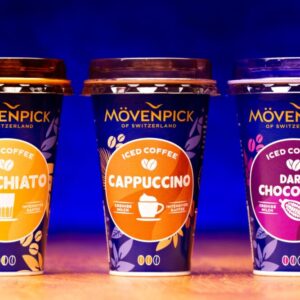Whole bean coffee is having its moment in the spotlight

Credit: AdobeStock
In a world where so many consumers crave convenience, some are eschewing speed for quality and flavour. The global whole bean coffee market reflects this growing appreciation, where freshness and flavour are valued as much as efficiency and accessibility. In 2024, the global whole bean coffee market was valued at USD $30.8 billion, per Research Intelo. With an estimated CAGR of 6.2%, the firm predicts the whole bean coffee market will reach $53.2 billion by 2033.
The growing popularity of whole bean coffee highlights a shift toward experiential consumption, where the process of grinding and brewing becomes part of the enjoyment, according to a new report from Research Intelo. Furthermore, the resurgence of interest in whole bean coffee aligns closely with the rise of artisanal movements, consumers and businesses alike are exploring quality over quantity, authenticity over imitation.
Over the past few years, the whole bean coffee market has witnessed consistent growth, driven by the expansion of specialty coffee culture across continents. The report notes that increasing numbers of independent roasters, boutique cafés, and home-brewing enthusiasts have contributed to this upward trend. “This evolution signifies a return to origins, where the journey of each bean, from plantation to cup, is celebrated.”
Research Intelo finds that four factors are shaping the dynamics of the whole bean coffee market, each steeped in changing lifestyles, global awareness, and innovation.
- Consumer Inclination Towards Freshly Ground Coffee: Freshly ground coffee is valued for its superior flavour, aroma, and quality compared to pre-ground options. The rise of specialty coffee shops and third-wave coffee culture has educated consumers on bean varieties, roasting, and brewing, driving higher demand for whole bean coffee, especially among millennials and urban consumers willing to pay a premium for artisanal and single-origin offerings.
- Technological Influence on Home Brewing: Advances in coffee machines and grinders have transformed home brewing, offering precise control over temperature, grind size, and brewing techniques. This accessibility has turned many households into mini cafés, boosting demand for fresh whole bean coffee.
- Ethical and Sustainable Consumption: Growing awareness of the environmental and social impacts of coffee production is driving consumers to favour brands that emphasise fair trade, organic certification, and direct relationships with farmers. In response, producers and retailers are offering traceable, sustainably sourced whole bean coffee, creating a competitive edge in a crowded market.
- Digital Transformation of the Retail Sector: E-commerce and subscription coffee services have expanded access to diverse whole bean options worldwide. These platforms offer convenience, educational content, and customer reviews, enhancing the consumer experience while enabling small and mid-sized roasters to reach wider audiences, boosting innovation and competition.
The whole bean market’s growth varies by geography but harmonises through a shared enthusiasm for quality coffee. According to Research Intelo:
- North America continues to lead the market, supported by a mature coffee culture, high per capita consumption, and a strong presence of specialty chains. The US drives regional demand through artisanal coffee shops, premiumisation, and home brewing, while Canada shows steady growth fueled by café culture and rising awareness of specialty coffee. [However, coffee prices in the US have surged dramatically in 2025 — retail coffee costs are up about 21–33% compared to last year, forcing many coffee lovers to change their consumption habits. President Trump issued an order on 14 November removing the reciprocal tariffs on many agricultural goods — including coffee and tea — imported from several Asia, Central and South American countries implemented in April.]
- Europe ranks as the second-largest market, rooted in a strong coffee tradition and a growing preference for premium, sustainable products. Key markets like Italy, Germany, France, and the UK emphasise quality, origin, and brewing expertise, with rising demand for specialty and single-origin beans influenced by third-wave coffee trends and espresso culture.
- Asia Pacific is the fastest-growing region, fuelled by rapid urbanisation, rising incomes, and the adoption of Western lifestyles, boosting coffee consumption in countries like China, Japan, South Korea, and Australia. The expansion of international chains and the emergence of local specialty roasters are cultivating a dynamic and diverse coffee culture across the region.
Research Intelo’s report did not discuss the Middle East, which is also experiencing robust growth in coffee consumption and the culture.
In terms of distribution, dynamics in the whole bean coffee market reflect the broader retail transformation underway. Supermarkets, hypermarkets, and specialty stores continue to dominate, offering visibility and trust. Specialty stores offer assortments that highlight limited-edition beans, single origin, single estate, and/or micro roasts.
However, the report reveals that online platforms have redefined how coffee travels. E-commerce has allowed small roasters to reach international customers, while subscription-based models ensure freshness and convenience. “Digital storytelling, featuring origin tales, roasting techniques, and farmer profiles, has become a defining feature of the modern coffee-buying experience.”
The report does indicate that the whole bean coffee market faces multiple risks that could hinder its growth. Those following the coffee market know that price fluctuations, driven by climate variability, pest outbreaks, and geopolitical tensions in major producing regions, threaten market stability and can squeeze profit margins for producers, roasters, and retailers, potentially raising costs for consumers.
As the market evolves, innovation, of course, will continue to shape how coffee is sourced, roasted, and consumed. Smart roasting technologies (as evidenced at Host Milan 2025) now enable precision profiling, ensuring consistency in flavour and aroma. Packaging innovations (on display at PACK EXPO Las Vegas 2025) preserve freshness longer, extending shelf life without compromising quality, while continuing to strive towards improved sustainability.
The report highlights how the integration of blockchain and data analytics in supply chains enhances traceability, allowing every cup to tell a story of its journey from the soil to the shelf. It also notes that artificial intelligence is even being used to predict flavour profiles based on bean origin and roasting conditions, redefining quality control in the process but does not mention specific roasters testing this process.
Research Intelo says that the whole bean coffee market stands at the crossroads of tradition and innovation. “It carries forward centuries of agricultural heritage while embracing digital transformation and sustainability. Whether sourced from the highlands of Ethiopia or the plantations of Colombia, each bean represents a global narrative of resilience, collaboration, and craftsmanship. The essence of the market’s strength lies in its ability to balance artistry with technology, flavour with responsibility, and passion with precision.” I hope ‘responsibility’ includes sustainability from origin through the supply chain ensuring viable incomes for producers and farm workers.
Vanessa L Facenda, editor, Tea & Coffee Trade Journal, [email protected]






